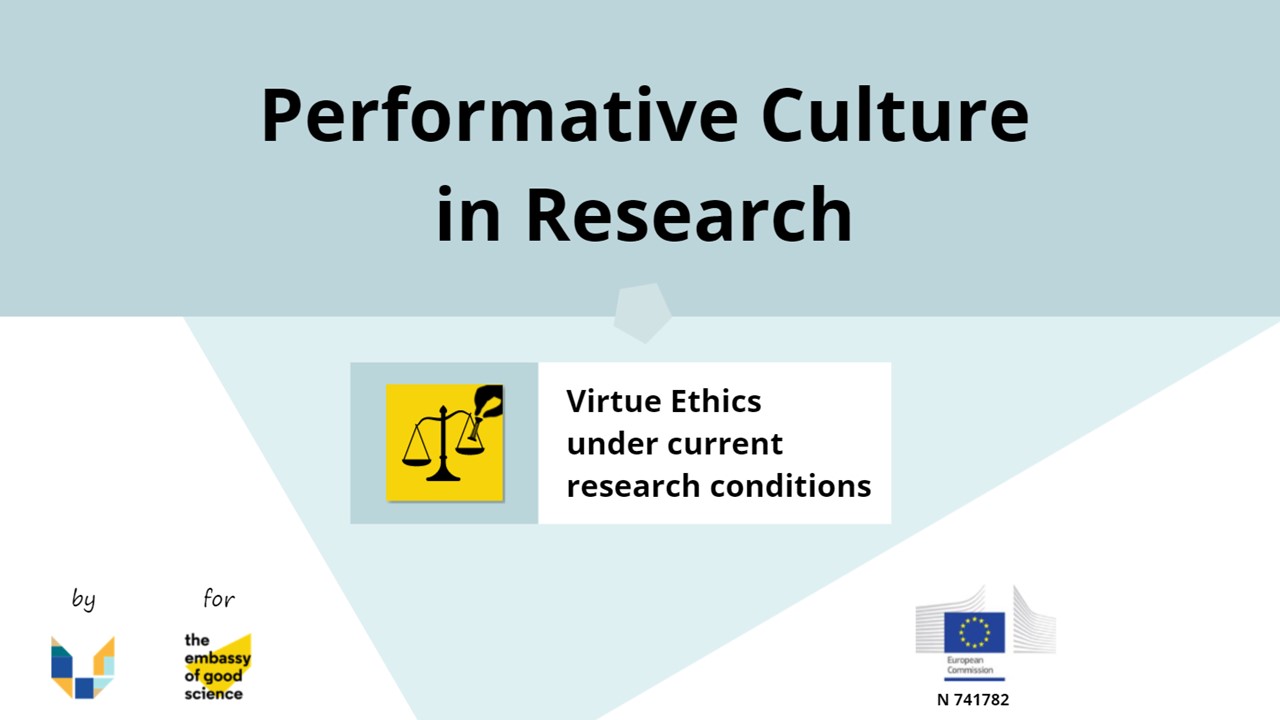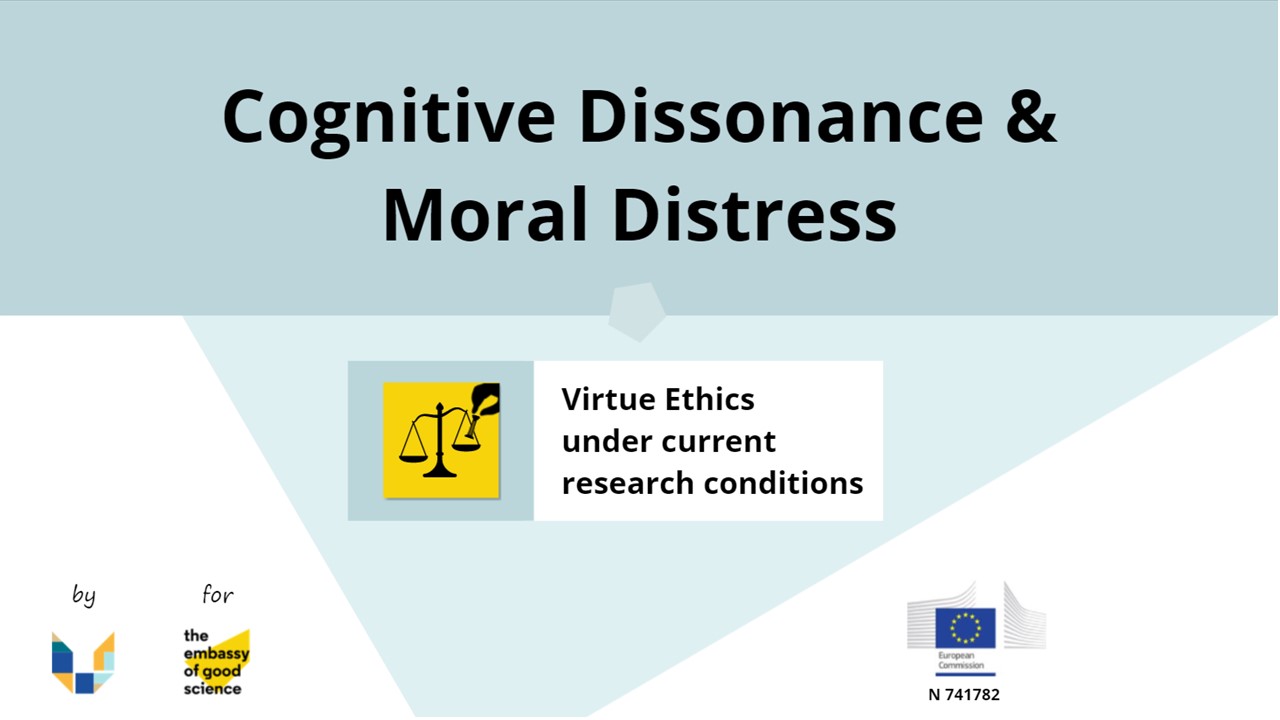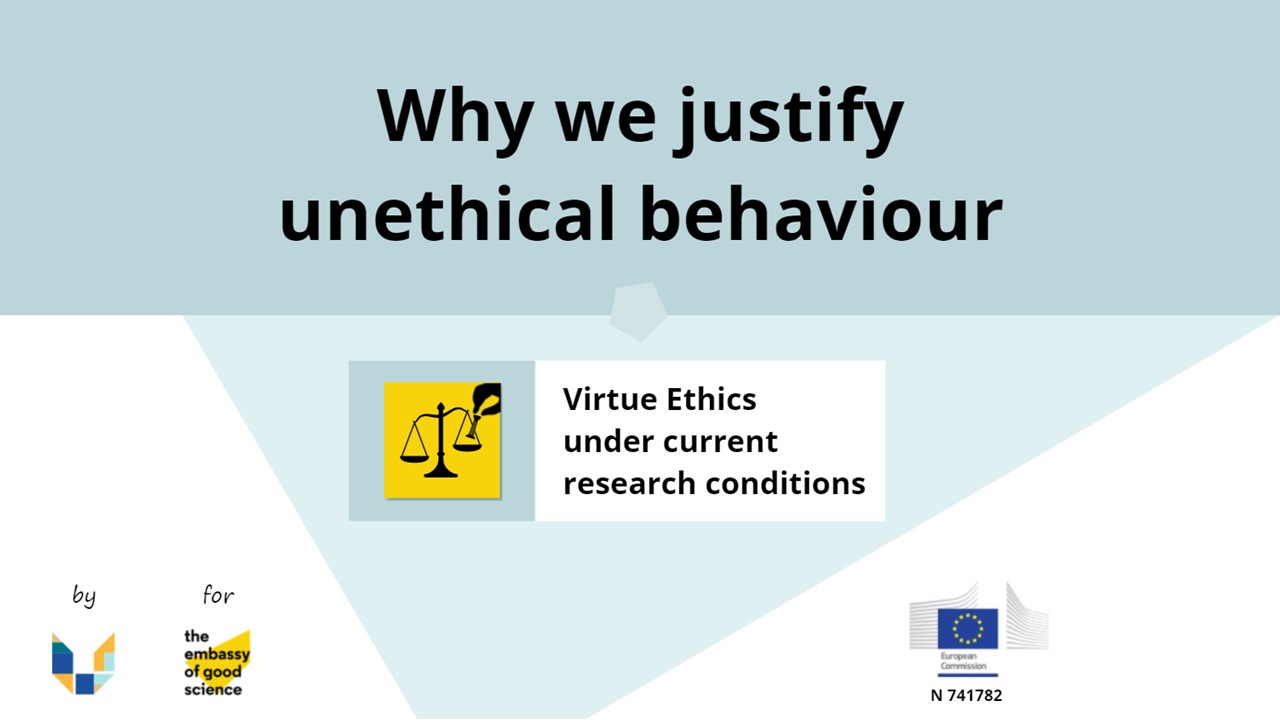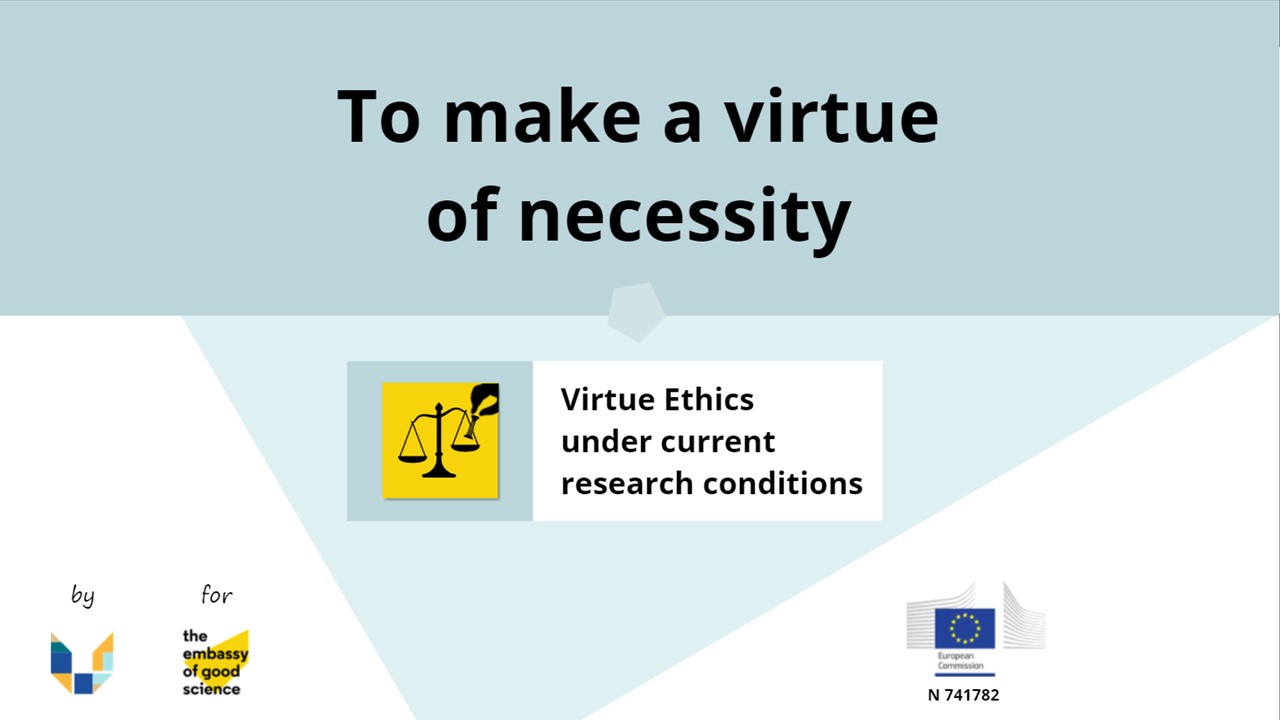Difference between revisions of "Instruction:43c900ea-a317-4528-8ece-1f3fb3564867"
| (9 intermediate revisions by 3 users not shown) | |||
| Line 1: | Line 1: | ||
{{Instruction | {{Instruction | ||
| − | |Title=Virtue Ethics under | + | |Title=Virtue Ethics under Current Research Conditions |
| − | |Instruction Goal=This series of eLearning modules | + | |Has Related Initiative=Initiative:8eed30fd-c2ed-44d1-9752-753092bd350e |
| − | |Has Requirements=This | + | |Instruction Goal=This series of eLearning modules fosters reflection on the current research culture and conditions that undermine values inherent in the scientific endeavour and make it more likely that researchers develop some vices. |
| + | |Has Requirements=This is the third of a four part series. The other three series are: [[Instruction:6ceba4e4-fb32-4953-9138-5436807fcde6|"Introduction to Research Integrity"]], [[Instruction:86f47366-a189-4395-9301-36ddb6d1fc68|"Introduction of Virtue Ethics to Research Integrity"]] and [https://embassy.science/wiki/Instruction:D3ee617b-5d9b-4c47-a015-030b0354c9d2 "Introduction to responsible supervision, mentoring and role-modeling"]. | ||
You need to have a background in research (i.e. be employed as researchers) or be a trainer/educator/teacher who has had experience in research in the past. | You need to have a background in research (i.e. be employed as researchers) or be a trainer/educator/teacher who has had experience in research in the past. | ||
| Line 8: | Line 9: | ||
'''VIRT2UE Online modules privacy statement''' | '''VIRT2UE Online modules privacy statement''' | ||
| − | This privacy statement | + | This privacy statement concerns the VIRT2UE online modules. The modules are part of the VIRT2UE training program. They are produced by the VIRT2UE consortium and made freely and openly available on the [https://github.com/the-embassy-of-good-science Github platform]. |
'''''All information of users remains client side''''' | '''''All information of users remains client side''''' | ||
| Line 20: | Line 21: | ||
[https://embassy.science/wiki/Special:Contact Contact us] if you have any further questions. | [https://embassy.science/wiki/Special:Contact Contact us] if you have any further questions. | ||
|Has Duration=1 | |Has Duration=1 | ||
| − | |Important For=Research | + | |Important For=Research integrity trainers; Researchers; Trainers in training |
|Has Method=eLearning | |Has Method=eLearning | ||
| − | |||
}} | }} | ||
{{Custom TabContent Trainee Open}} | {{Custom TabContent Trainee Open}} | ||
| Line 33: | Line 33: | ||
*'''The necessity and risks of applying self-justification strategies:''' You will be guided and invited to reflect on the self-justification strategies you might use, and the possible unintended consequences they might lead to, like the development of cognitive biases. | *'''The necessity and risks of applying self-justification strategies:''' You will be guided and invited to reflect on the self-justification strategies you might use, and the possible unintended consequences they might lead to, like the development of cognitive biases. | ||
| − | *'''The most relevant | + | *'''The most relevant breaches of research integrity in your discipline and possible self-justification strategies:''' After identifying the most relevant violations of research integrity in your discipline you will be invited to write different types of self-justification strategies. |
|Important Because=It is crucial for participants to complete the online modules in advance of the face-to-face training in order to acquire a shared understanding of the program’s core concepts. | |Important Because=It is crucial for participants to complete the online modules in advance of the face-to-face training in order to acquire a shared understanding of the program’s core concepts. | ||
|Has Practical Tips=There are subtitles available. You may enable them by clicking on "CC" at the lower left corner of the player. | |Has Practical Tips=There are subtitles available. You may enable them by clicking on "CC" at the lower left corner of the player. | ||
| Line 41: | Line 41: | ||
{{Instruction Step Trainee | {{Instruction Step Trainee | ||
|Instruction Step Title=Performative Culture in Research | |Instruction Step Title=Performative Culture in Research | ||
| − | |Instruction Step Text=This module starts with the assumption that many researchers may perceive | + | |Instruction Step Text=This module starts with the assumption that many researchers may perceive a tension between virtue ethics and performative pressures in research. Drawing upon the work of Bruce Macfarlane[[#%20ftn1|[1]]], a culture of performativity is explored, as well as the question of whether current research conditions create incentives to be boastful. A reflection exercise asks learners to reflect on the effect of a performative culture in research, and whether these may tempt to act more boastfully. |
| − | [http://courses.embassy.science/performative_culture_in_research/story.html | + | [[File:Performative Culture in Research.jpg|link=http://courses.embassy.science/performative_culture_in_research/story.html]] |
| + | |||
| + | If you want to integrate this module into your institution's learning management system, you may download it as a SCORM Package [http://courses.embassy.science/Performative%20Culture%20in%20Research_SCORM.zip here] | ||
----[[#%20ftnref1|[1]]] Macfarlane, B. (2010). ''Researching with integrity: The ethics of academic enquiry''. Routledge. | ----[[#%20ftnref1|[1]]] Macfarlane, B. (2010). ''Researching with integrity: The ethics of academic enquiry''. Routledge. | ||
}} | }} | ||
{{Instruction Step Trainee | {{Instruction Step Trainee | ||
|Instruction Step Title=Cognitive Dissonance & Moral Distress in Research | |Instruction Step Title=Cognitive Dissonance & Moral Distress in Research | ||
| − | |Instruction Step Text=This module aims to explain and demonstrate the underlying dynamics and relevance of cognitive dissonance for the research process. Along with the example of honorary authorship, it is discussed how conflicting imperatives (or underlying conflicting values) inherent in the current research system may be experienced as cognitive dissonance or moral distress. This module further invites | + | |Instruction Step Text=This module aims to explain and demonstrate the underlying dynamics and relevance of cognitive dissonance for the research process. Along with the example of honorary authorship, it is discussed how conflicting imperatives (or underlying conflicting values) inherent in the current research system may be experienced as cognitive dissonance or moral distress. This module further invites reflection on the experience of cognitive dissonance and moral distress in one's research. |
| + | [[File:Cognitive Dissonance and Moral Distress.jpg|link=http://courses.embassy.science/cognitive_dissonance_and_moral_distress/story.html]] | ||
| − | [http://courses.embassy.science/ | + | If you want to integrate this module into your institution's learning management system, you may download it as a SCORM Package [http://courses.embassy.science/Cognitive%20Dissonance%20&%20Moral%20Distress_SCORM.zip here] |
}} | }} | ||
{{Instruction Step Trainee | {{Instruction Step Trainee | ||
| − | |Instruction Step Title=Why | + | |Instruction Step Title=Why We Justify Unethical Behaviour |
|Instruction Step Text=This module aims to both explain and demonstrate the underlying dynamics informing the application of self-justification strategies in research. In a two-step exercise, learners are first required to choose the most relevant violation of research integrity in their discipline. Then, they are asked to write different types of self-justification strategies (e.g. denial of responsibility, trivialization) that has previously been introduced to them with the example of honorary authorship. | |Instruction Step Text=This module aims to both explain and demonstrate the underlying dynamics informing the application of self-justification strategies in research. In a two-step exercise, learners are first required to choose the most relevant violation of research integrity in their discipline. Then, they are asked to write different types of self-justification strategies (e.g. denial of responsibility, trivialization) that has previously been introduced to them with the example of honorary authorship. | ||
| − | [http://courses.embassy.science/why_we_justify_unethical_behaviour/story.html | + | [[File:Why we Justify Unethical Behaviour.jpg|link=http://courses.embassy.science/why_we_justify_unethical_behaviour/story.html]] |
| + | |||
| + | |||
| + | If you want to integrate this module into your institution's learning management system, you may download it as a SCORM Package [http://courses.embassy.science/Why%20we%20justify%20unethical%20behaviour_SCORM.zip here] | ||
}} | }} | ||
{{Instruction Step Trainee | {{Instruction Step Trainee | ||
| − | |Instruction Step Title=To | + | |Instruction Step Title=To Make a Virtue of Necessity |
| − | |Instruction Step Text=This module explores, whether the experience of cognitive dissonance or moral distress may pose a possible necessity to | + | |Instruction Step Text=This module explores, whether the experience of cognitive dissonance or moral distress may pose a possible necessity to transform distress into eustress, that is, into a positive incentive to cultivate virtues. The relevance of five virtues is further explained with a hypothetical situation, in which a researcher is confronted with clear evidence that undermines the theory he/she has been working on (and building his/her academic self-concept around). |
| + | |||
| + | [[File:To Make a Virtue of Necessity.jpg|link=http://courses.embassy.science/to_make_a_virtue_of_necessity/story.html]] | ||
| + | |||
| − | [http://courses.embassy.science/ | + | If you want to integrate this module into your institution's learning management system, you may download it as a SCORM Package [http://courses.embassy.science/To%20make%20a%20virtue%20of%20necessity_SCORM.zip here] |
}} | }} | ||
{{Instruction Remarks Trainee | {{Instruction Remarks Trainee | ||
| Line 97: | Line 106: | ||
{{Instruction Step Trainer | {{Instruction Step Trainer | ||
|Instruction Step Title=Performative Culture in Research | |Instruction Step Title=Performative Culture in Research | ||
| − | |Instruction Step Text=This module starts with the assumption that many researchers may perceive the notion of virtue ethics in conflict with performative pressures in research. Drawing upon the work of Bruce Macfarlane[[#%20ftn1|[1]]], a culture of performativity is explored, as well as the question of whether current research conditions may involve incentives to be boastful. A reflection exercise asks learners to reflect on the effect of a performative culture in research, and whether these may tempt them to act more boastfully. | + | |Instruction Step Text=This module starts with the assumption that many researchers may perceive the notion of virtue ethics in conflict with performative pressures in research. Drawing upon the work of Bruce Macfarlane[[#%20ftn1|[1]]], a culture of performativity is explored, as well as the question of whether current research conditions may involve incentives to be boastful. A reflection exercise asks learners to reflect on the effect of a performative culture in research, and whether these may tempt them to act more boastfully. |
[http://courses.embassy.science/performative_culture_in_research/story.html Open course] | [http://courses.embassy.science/performative_culture_in_research/story.html Open course] | ||
| Line 105: | Line 114: | ||
|Instruction Step Title=Cognitive Dissonance & Moral Distress in Research | |Instruction Step Title=Cognitive Dissonance & Moral Distress in Research | ||
|Instruction Step Text=This module aims to explain and demonstrate the underlying dynamics and relevance of cognitive dissonance for the research process. Along with the example of honorary authorship, it is discussed how conflicting imperatives (or underlying conflicting values) inherent in the current research system may be experienced as cognitive dissonance or moral distress. This module further invites to reflect upon the experience of cognitive dissonance and moral distress in one's research. | |Instruction Step Text=This module aims to explain and demonstrate the underlying dynamics and relevance of cognitive dissonance for the research process. Along with the example of honorary authorship, it is discussed how conflicting imperatives (or underlying conflicting values) inherent in the current research system may be experienced as cognitive dissonance or moral distress. This module further invites to reflect upon the experience of cognitive dissonance and moral distress in one's research. | ||
| + | |||
[http://courses.embassy.science/cognitive_dissonance_and_moral_distress/story.html Open course] | [http://courses.embassy.science/cognitive_dissonance_and_moral_distress/story.html Open course] | ||
| Line 110: | Line 120: | ||
{{Instruction Step Trainer | {{Instruction Step Trainer | ||
|Instruction Step Title=Why we justify unethical behaviour | |Instruction Step Title=Why we justify unethical behaviour | ||
| − | |Instruction Step Text=This module aims to both explain and demonstrate the underlying dynamics informing the application of self-justification strategies in research. In a two-step exercise, learners are first required to choose the most relevant violation of research integrity in their discipline. Then, they are asked to write different types of self-justification strategies (e.g. denial of responsibility, trivialization) that has previously been introduced to them with the example of honorary authorship. | + | |Instruction Step Text=This module aims to both explain and demonstrate the underlying dynamics informing the application of self-justification strategies in research. In a two-step exercise, learners are first required to choose the most relevant violation of research integrity in their discipline. Then, they are asked to write different types of self-justification strategies (e.g. denial of responsibility, trivialization) that has previously been introduced to them with the example of honorary authorship. |
[http://courses.embassy.science/why_we_justify_unethical_behaviour/story.html Open course] | [http://courses.embassy.science/why_we_justify_unethical_behaviour/story.html Open course] | ||
| Line 117: | Line 127: | ||
|Instruction Step Title=To make a virtue of necessity | |Instruction Step Title=To make a virtue of necessity | ||
|Instruction Step Text=This module explores, whether the experience of cognitive dissonance or moral distress may pose a possible necessity to translate the distress into eustress, that is, into a positive incentive to cultivate virtues. The relevance of five virtues is further explained with a hypothetical situation, in which a researcher is confronted with clear evidence that undermines the theory he/she has been working on (and building his/her academic self-concept around). | |Instruction Step Text=This module explores, whether the experience of cognitive dissonance or moral distress may pose a possible necessity to translate the distress into eustress, that is, into a positive incentive to cultivate virtues. The relevance of five virtues is further explained with a hypothetical situation, in which a researcher is confronted with clear evidence that undermines the theory he/she has been working on (and building his/her academic self-concept around). | ||
| + | |||
[http://courses.embassy.science/to_make_a_virtue_of_necessity/story.html Open course] | [http://courses.embassy.science/to_make_a_virtue_of_necessity/story.html Open course] | ||
| Line 132: | Line 143: | ||
{{Related To | {{Related To | ||
|Related To Resource=Resource:5bbdd729-8f96-432a-a0ee-56510e343d01 | |Related To Resource=Resource:5bbdd729-8f96-432a-a0ee-56510e343d01 | ||
| − | |Related To Theme=Theme:Cda80c83-0101-4e27-bdc0-87a45846e5ed;Theme:28a0859b-9e52-4af4-97f0-b0f8eeac1f1c | + | |Related To Theme=Theme:Cda80c83-0101-4e27-bdc0-87a45846e5ed; Theme:28a0859b-9e52-4af4-97f0-b0f8eeac1f1c |
| − | |Related To Instruction=Instruction: | + | |Related To Instruction=Instruction:86f47366-a189-4395-9301-36ddb6d1fc68; Instruction:6ceba4e4-fb32-4953-9138-5436807fcde6 |
}} | }} | ||
{{Tags | {{Tags | ||
Latest revision as of 15:29, 16 April 2024
Virtue Ethics under Current Research Conditions
This is the third of a four part series. The other three series are: "Introduction to Research Integrity", "Introduction of Virtue Ethics to Research Integrity" and "Introduction to responsible supervision, mentoring and role-modeling".
You need to have a background in research (i.e. be employed as researchers) or be a trainer/educator/teacher who has had experience in research in the past.
VIRT2UE Online modules privacy statement
This privacy statement concerns the VIRT2UE online modules. The modules are part of the VIRT2UE training program. They are produced by the VIRT2UE consortium and made freely and openly available on the Github platform.
All information of users remains client side
At no point during the use of the VIRT2UE online modules is any personal information collected or saved. Information entered into the modules remains ‘client side’ and is not sent back to servers, nor made available for use by third parties.
Entering personal information in the modules
At some places in the modules the user is invited to type input in open fields. Information entered into these fields is not sent back to any server. None of the entered information can be traced back to the user. It is not obligatory to use these fields. Users can also choose to document their responses elsewhere, for instance on paper.
Contact us if you have any further questions.What is this about?
By taking these eLearning modules you will learn about and reflect on:
- Your experience of cognitive dissonance in a research related context: You will be guided in recognizing the relevance and dynamics of cognitive dissonance within the research process.
- The necessity and risks of applying self-justification strategies: You will be guided and invited to reflect on the self-justification strategies you might use, and the possible unintended consequences they might lead to, like the development of cognitive biases.
- The most relevant breaches of research integrity in your discipline and possible self-justification strategies: After identifying the most relevant violations of research integrity in your discipline you will be invited to write different types of self-justification strategies.
Why is this important?
Practical Tips
There are subtitles available. You may enable them by clicking on "CC" at the lower left corner of the player.
Please note that no information will be saved or stored after you have closed the browser window/tab. This has two major implications: (1) Whenever you close your browser window/tab, your progress will not be saved and you will have to start the module anew. It is not necessary to complete the course in one go, but recommended to leave the browser window/tab open (and the computer/laptop running). (2) In case you aim to save your reflections, you are kindly asked to copy/paste your input in a separate document and save it on your computer, BEFORE you submit your input (A print-out solution is planned, but is not available yet).Performative Culture in Research
This module starts with the assumption that many researchers may perceive a tension between virtue ethics and performative pressures in research. Drawing upon the work of Bruce Macfarlane[1], a culture of performativity is explored, as well as the question of whether current research conditions create incentives to be boastful. A reflection exercise asks learners to reflect on the effect of a performative culture in research, and whether these may tempt to act more boastfully.
If you want to integrate this module into your institution's learning management system, you may download it as a SCORM Package here
[1] Macfarlane, B. (2010). Researching with integrity: The ethics of academic enquiry. Routledge.
Cognitive Dissonance & Moral Distress in Research
This module aims to explain and demonstrate the underlying dynamics and relevance of cognitive dissonance for the research process. Along with the example of honorary authorship, it is discussed how conflicting imperatives (or underlying conflicting values) inherent in the current research system may be experienced as cognitive dissonance or moral distress. This module further invites reflection on the experience of cognitive dissonance and moral distress in one's research.
If you want to integrate this module into your institution's learning management system, you may download it as a SCORM Package hereWhy We Justify Unethical Behaviour
This module aims to both explain and demonstrate the underlying dynamics informing the application of self-justification strategies in research. In a two-step exercise, learners are first required to choose the most relevant violation of research integrity in their discipline. Then, they are asked to write different types of self-justification strategies (e.g. denial of responsibility, trivialization) that has previously been introduced to them with the example of honorary authorship.
To Make a Virtue of Necessity
This module explores, whether the experience of cognitive dissonance or moral distress may pose a possible necessity to transform distress into eustress, that is, into a positive incentive to cultivate virtues. The relevance of five virtues is further explained with a hypothetical situation, in which a researcher is confronted with clear evidence that undermines the theory he/she has been working on (and building his/her academic self-concept around).
Remarks
List of contributors:
Armin Schmolmüller
We thank Rosemarie Bernabe, Fenneke Blom, Birgit Buschbom, Ana Sofia Carvalho, Natalie Evans, Nicole Föger, Laura Hartman, Teodora Konach, Erika Löfström, Franca Marino, Ana Marusic, Signe Mezinska, Bert Molewijk, Daniel Pizzolato, and Guy Widdershoven for their constructive feedback during the process of developing!
This training has been developed by the VIRT2UE project, which has received funding form the European Union’s H2020 research programme under grant agreement N 741782.What is this about?
This series of eLearning modules supports users in reflecting on possible circumstances that might undermine a good research and and prevent researchers from developing virtues. By taking these modules learners will:
- Reflect on their experience of cognitive dissonance[1] in a research related context. Both in explaining and demonstrating the underlying dynamics and relevance of cognitive dissonance for the research process, learners are likely to experience this psychological discomfort, and reflect upon it.
- Reflect on the necessity and risks of applying self-justification strategies. Both in explaining and demonstrating the underlying dynamics informing the application of self-justification strategies in research, learners are invited to reflect on the self-justification strategies they use, and the possible unintended consequences, like the development of cognitive biases.
- Select the most relevant breach of research integrity in their discipline and invent self-justification strategies. In a two-step exercise, learners are first required to choose the most relevant violation of research integrity in their discipline. Then, they are asked to write different types of self-justification strategies (e.g. denial of responsibility, trivialization) that have previously introduced to them with the example of honorary authorship.
- ↑ Cognitive Dissonance Theory was initiated by Festinger, L. (1957). A Theory of Cognitive Dissonance. Stanford University Press
Why is this important?
Practical Tips
There are subtitles available. You may enable them by clicking on "CC" at the lower left corner of the player.
Please note that no information will be saved or stored after users have closed the browser window/tab. This has two major implications: (1) Whenever users close their browser window/tab, their progress will not be saved and they will have to start the module anew. It is not necessary to complete the course in one go, but recommended to leave the browser window/tab open (and the computer/laptop running). (2) In case users aim to save their reflections, they are kindly asked to copy/paste their input in a separate document and save it on their computer.Performative Culture in Research
This module starts with the assumption that many researchers may perceive the notion of virtue ethics in conflict with performative pressures in research. Drawing upon the work of Bruce Macfarlane[1], a culture of performativity is explored, as well as the question of whether current research conditions may involve incentives to be boastful. A reflection exercise asks learners to reflect on the effect of a performative culture in research, and whether these may tempt them to act more boastfully.
[1] Macfarlane, B. (2010). Researching with integrity: The ethics of academic enquiry. Routledge.
Cognitive Dissonance & Moral Distress in Research
This module aims to explain and demonstrate the underlying dynamics and relevance of cognitive dissonance for the research process. Along with the example of honorary authorship, it is discussed how conflicting imperatives (or underlying conflicting values) inherent in the current research system may be experienced as cognitive dissonance or moral distress. This module further invites to reflect upon the experience of cognitive dissonance and moral distress in one's research.
Why we justify unethical behaviour
This module aims to both explain and demonstrate the underlying dynamics informing the application of self-justification strategies in research. In a two-step exercise, learners are first required to choose the most relevant violation of research integrity in their discipline. Then, they are asked to write different types of self-justification strategies (e.g. denial of responsibility, trivialization) that has previously been introduced to them with the example of honorary authorship. Open course
To make a virtue of necessity
This module explores, whether the experience of cognitive dissonance or moral distress may pose a possible necessity to translate the distress into eustress, that is, into a positive incentive to cultivate virtues. The relevance of five virtues is further explained with a hypothetical situation, in which a researcher is confronted with clear evidence that undermines the theory he/she has been working on (and building his/her academic self-concept around).
Remarks
List of contributors:
Armin Schmolmüller
We thank Rosemarie Bernabe, Fenneke Blom, Birgit Buschbom, Ana Sofia Carvalho, Natalie Evans, Nicole Föger, Laura Hartman, Teodora Konach, Erika Löfström, Franca Marino, Ana Marusic, Signe Mezinska, Bert Molewijk, Daniel Pizzolato, and Guy Widdershoven for their constructive feedback during the process of developing!
This training has been developed by the VIRT2UE project, which has received funding form the European Union’s H2020 research programme under grant agreement N 741782.




